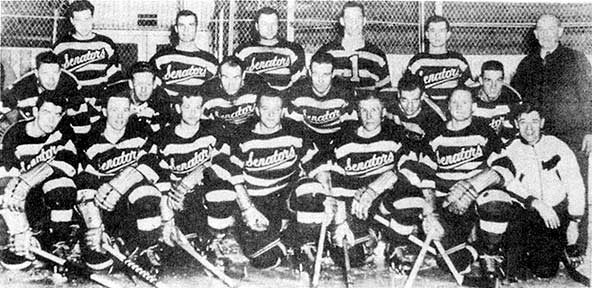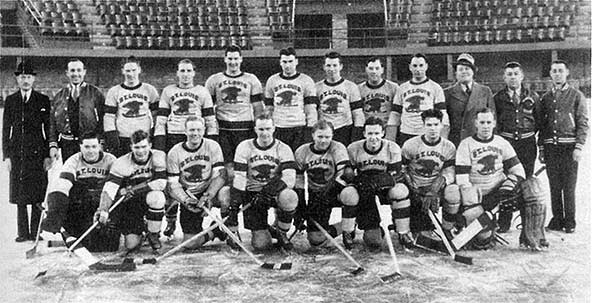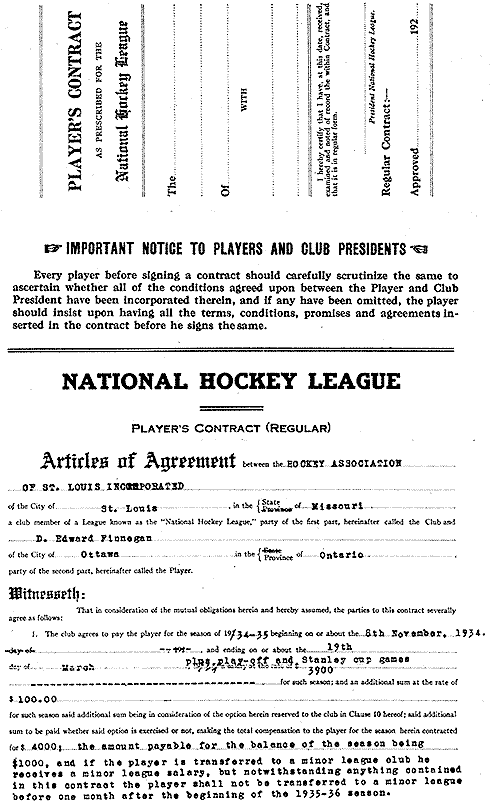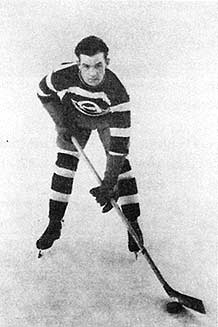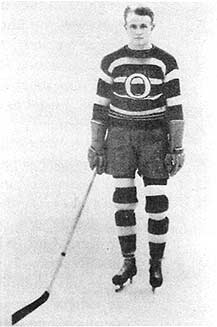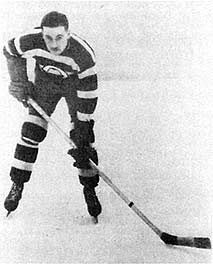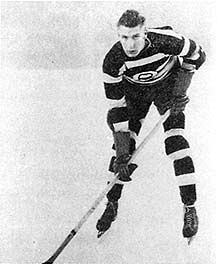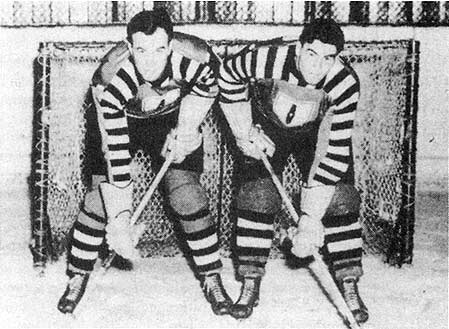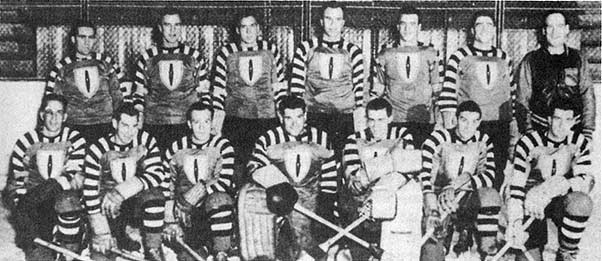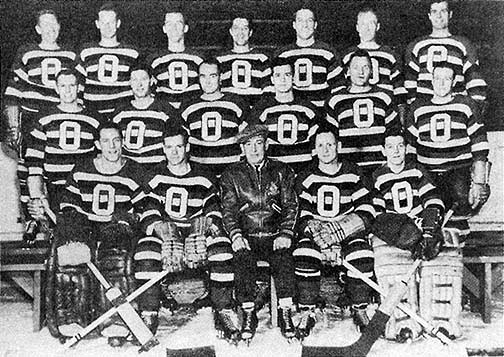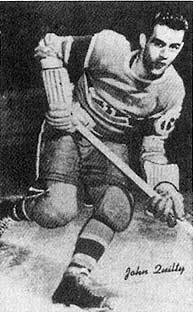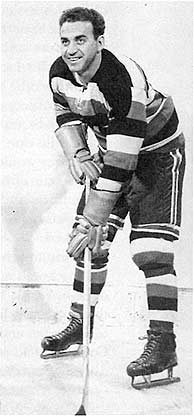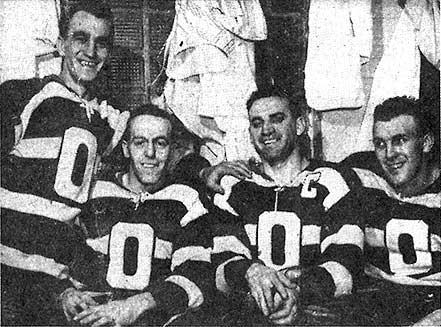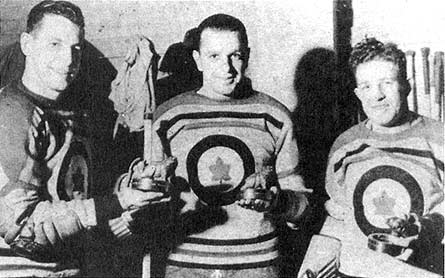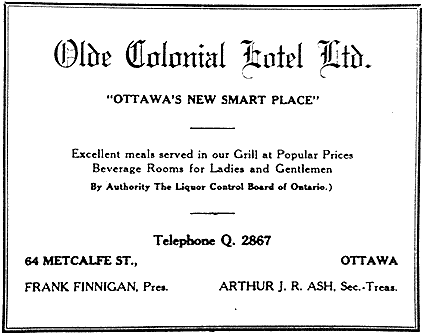|
And Eddie said, "Look if
you wait a half an hour the sun will be around and it'll shine in and you
won't need the light." So Clancy went down to a hardware store and he
bought a lantern, an old coal oil lantern, and just before the game, he
lit the lantern and just before the game started he walked across the ice
and presented it to Shore. He handed him the thing.
Oh, if you were hurt and you couldn't play Shore used to make you sell
programs. Oh, yes. The players. Or he'd make them sell candy bars. He was
wild. He'd give you a thousand dollars and then he'd fine you five hundred.
For nothin'. He'd call a practice at ten o'clock in the morning and he'd
tell you it was at eleven. Then you'd come in late and he say, "Five
hundred bucks, you're late." He'd say, "I told you ten.
Everybody else was here at ten." If you were sick or didn't feel good,
do you know what you got? A spoonful of iodine. He'd make them drink it.
The players would say, "Let's get so and so," and they'd say,
"Eddie, Jim doesn't feel too well."
He'd say, "What's the matter?" "Oh something's wrong, he's
not well there's something wrong with his stomach." "Get the
iodine. Get the iodine." And he'd say, "No. No. Eddie, I'm fine.
I'm fine. I'm okay I'm not sick." The guy said it never killed, but
it sure did cure me. Tell you who can tell you about Shore is the guy that
coaches the 67s he played for him. "Giggy" Kilrea, he played
with him. Shore put hobbles on him. Yes, hobbles like a horse used to wear
when they stood on the streets. The breadman would put them on, and the
milkman ... in Ottawa. If Kilrea didn't skate the way Shore wanted him to
skate, and he wanted him to skate up, so he had this goddam thing made out
of wood and put it on him and he used to make him practice with this thing
on. Like a wood thing. Kilrea will tell you that. 'Cos Kilrea was the
first guy that started the strike in the hockey, you know. The Springfield
team was the first team that went on strike. And that's when they got rid
of Eddie Shore. Yeah, and when they got rid of Shore the league people
came in and said, "We're sorry Eddie, but it's time to go." So
he gave the team to his son and they say his son was just as bad as he
was. Oh there's lots of stories like that.
They broke training all the time. I mean they smoked, they drank. We used
to leave here, that old Quebec league, and we'd go down to Union Station
and the train was at twelve o'clock, and we used to get to Bowles Lunch
there used to be Bowles Lunch down at the old station then and
then they'd get beer. Dr. Cootes owned Capital Breweries down at the
corner of Preston and Wellington. I don't know if he was a real medical
doctor. He could have been a medical doctor, but he owned the whole
brewery. He bought it from E.P. Taylor or E.P. Taylor bought it from him
one or the other. And we always had a case of beer after the game. We used
to keep it out in the snow at the back of the rink. And when we went to
Quebec City we used to stop off at a siding in Montreal and lay over
overnight. The two Lemays and a few others all got up and went to mass
cross over the tracks to church and back. Six in the morning. And then
we'd get to Quebec City and play the game and then the first thing they
did was go for beer. There used to be a little place right opposite the
station called The Hole in the Wall. And they'd buy six, seven quarts you
know and bring them on the train. And of course in those days they were
all the old wicker seats and they had all this beer, everybody had two or
three quarts, and they walked in and there were twelve nuns sitting
and they'd been cursing and swearing you know? Twelve nuns.
The Senators were wild, too. 1 remember Clancy telling me a story. I used
to run into Clancy in the Quebec League when the King was refereeing and
we used to catch him on the train. He'd get the train in Toronto and that
we would catch to go to Montreal and Quebec City, see. Clancy would always
be there and he knew everybody. He used to tell us all kinds of stories.
What the hell was it? The train broke down in Hawkesbury or somewhere in
the dead of winter and they got out and they must have walked about three
miles through the snow and went to this restaurant, Chinese restaurant in
Hawkesbury. Two o'clock in the morning, and they pounded on the door. They
wanted to eat. Buck Boucher, Clancy, maybe Frank and the other guys that
were there. And the guy said, "Me closee. Me closee." They said,
"We'll break the door down." And they went in and they made him
cook bacon and eggs and things till they got the train going. Clancy told
me that.
I remember in Montreal they used to take a pail of water . . . you know,
in the hotels in those days there was always a transom and they'd put the
goddam pail up there and just tip it. They'd phone somebody and say,
"Come down to my room, I've got something to show you." And when
he'd open the door, down came the water. Things like that. Louis St. Denis,
I remember he used to be down in the Windsor Hotel or the Queen's Hotel,
and there was a big sumptuous dining-room there and they had the orchestra
and the violins, you know. St. Denis be there and he'd have a suit coat on
and he'd have this red cravet with white polka dots. Course we knew what
he had on underneath. He used to wear a sweatshirt from the Rideau Aquatic
Club. Then they'd grab him and take the goddam coat off him and he's
sitting there with all these people in evening gowns with Rideau Aquatic
Club in front of the thing. Crazy you know.
The best one there was about Alex Connell. Well, Alex Connell he was
apparently quite a mimic, impersonator and everything you know. He was
down there one time and he got up on the stage and took the violin away
from the guy and played some beautiful operas all by himself. And what
he'd done, he'd put the guy that played the violin behind the curtains and
Alex was just mimicking he wasn't playing at all. And the people
applauded and applauded. And this guy's behind the curtain playing the
violin and Connell's out there and he's like this. That was in Montreal
too. At the Queens or the Windsor Hotel.. .
Eddie Finnigan, Frank's brother, I knew better than Frank. Eddie played
for The Senators after they disbanded professionally and
became part of the Quebec Senior Hockey League. They all got paid but they
were not supposed to be paid. And Eddie was famous for sleeping,
absolutely famous.
Jim McCaffrey, the team owner, used to discover just before game time that
Eddie was missing. And he'd yell at me, "Eddie, for Chrissakes, get
over there and waken Eddie up!" So I'd have to run over to Arlington
Street, a few blocks away from The Auditorium, and waken Eddie up and get
him over to the game, still with the sleep in his eyes.
One time I was in the dressing room between periods with the players and
Eddie was away over in a corner with a newspaper over his face. And
McCaffrey yelled at me, "For Chrissakes, see what Eddie's doing in
the corner there," And I went over and lifted up the newspaper and my
God! He was asleep under it! Asleep between periods!
Eddie one time badly needed a new pair of skates and Jim McCaffrey
wouldn't, or couldn't, buy them for him. So Eddie got an old pair of black
boots, walking boots, and put them on with his uniform and went out onto
the ice for practice with the working boots on to shame McCaffrey into
getting him new skates. It worked!
One time when the Ottawa Senators were staying at one of the big hotels
with a swimming pool a big thing back in those days Frank "King"
Clancy bet Charlie Conacher fifty dollars that he could high-dive off the
tower in his tuxedo. Conacher took the bet and Clancy duly did a clown
dive off the board. After Conacher had paid over the fifty dollars, Clancy
took off the tuxedo , dripping, shriveled, and handed it to Conacher.
"Here, Charlie," he said. "It's not mine. It's yours!"
Connie Brown from Ottawa, he used to play a bit for Detroit, and he went
to St. Malachi's school and in those days you had to pay a two-dollar fee
to take your entrance examinations (Grade Eight), so the principal of St.
Malachi's School Father Somebody or other and this was in the
Depression, remember phoned Connie Brown's father and said to him,
"Mr. Brown, don't spend your two dollars on Connie. He'll never make
it."
One time in some game or other, I can't remember, Connie Brown ended up in
a terrible donnybrook on the ice facing Red Kelly. With a twinkle in his
eye Brown said to Kelly, "Say, Red, I can't box, you know."
"Neither can I," said Kelly. "Let's wrestle!"
During
the 1940s and 1950s Howard Riopelle not only followed the fortunes of
amateur hockey in Ottawa but also came to play for The Senators in the
Quebec Senior League after a brief career in the N.H.L. with the Montreal
Canadiens. In this interview, conducted in April 1992, he recalls the
great hockey played in Ottawa during the "lost years" and offers
some advice on managing the new Senators N.H.L. team: |
|
